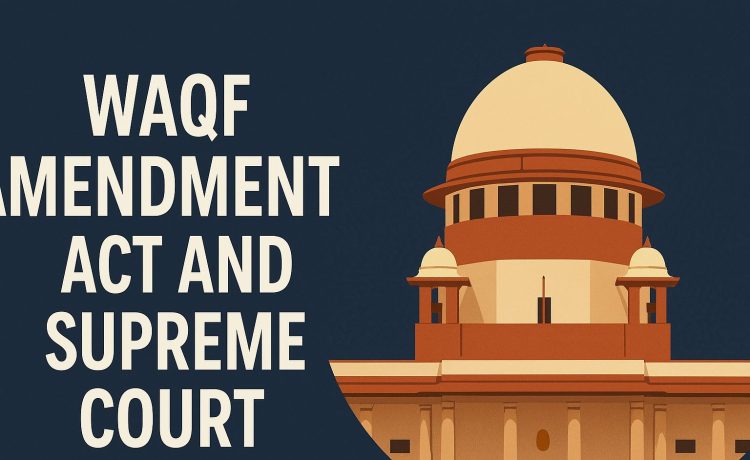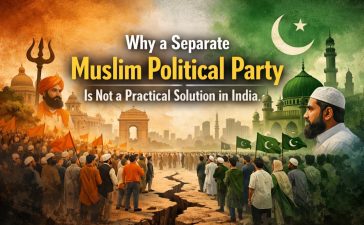Top Court to Examine Stay on Key Provisions as Centre Assures No Immediate Implementation
New Delhi, May 16 — The Supreme Court on Thursday deferred the hearing on petitions challenging the constitutional validity of the Waqf (Amendment) Act, 2025 to May 20, restricting the proceedings to the question of interim relief. A Bench led by Chief Justice of India (CJI) B.R. Gavai and comprising Justice A.G. Masih will examine whether a stay is warranted on three contentious provisions: waqf by user, nomination of non-Muslims to Waqf bodies, and the identification of government land under waqf.
The Court noted that the Centre’s assurance—given by Solicitor General Tushar Mehta—that it would refrain from enforcing the disputed provisions would remain in effect until further orders. “We will grant two hours to each side,” the Bench stated before adjourning the case.
Controversial Amendments Under Scrutiny
The Waqf (Amendment) Act, 2025, which amended the 1995 law to regulate properties dedicated to Islamic religious or charitable purposes, was passed by Parliament in April and received Presidential assent on April 5. The amendments have sparked fierce opposition, with petitioners, including Congress MP Mohammad Jawed and AIMIM chief Asaduddin Owaisi, alleging that the changes discriminate against Muslims by interfering with their right to manage religious endowments.
At the heart of the challenge is the removal of waqf by user—a provision that historically recognized mosques, graveyards, and charitable properties as waqf even without formal deeds. Critics argue this omission could strip centuries-old Islamic sites of their protected status.
Centre Defends Amendments, Cites Misuse
In its affidavit, the Union government defended the amendments, claiming they were necessary to curb the misuse of waqf laws to encroach on private and government land. The Centre cited a 116% surge in auqaf (waqf properties) after the 2013 amendments, alleging that unverified claims were depriving citizens and the state of property rights.
“The exclusion of waqf by user does not negate the right to dedicate property to God but ensures compliance with statutory formalities,” the government stated. It further justified the inclusion of non-Muslim members in Waqf bodies, asserting their “microscopic minority” presence promotes inclusivity without infringing on Muslim rights under Article 26 of the Constitution.
Political Divide Over the Law
While opposition leaders and Muslim groups have decried the amendments, six BJP-ruled states—Haryana, Maharashtra, Madhya Pradesh, Rajasthan, Chhattisgarh, and Assam—have intervened in support. These states emphasized the potential impact on their governance if the law were struck down.
On April 17, the Centre assured the Court it would hold off on implementing key provisions, including the formation of new Waqf bodies and de-notification of existing properties. The Court recorded this undertaking without issuing a formal stay.
What Next?
The May 20 hearing will determine whether interim relief is warranted. Legal experts suggest the Court’s decision could hinge on balancing religious autonomy with the need to prevent alleged misuse of waqf laws.
With both sides digging in, the outcome may set a precedent for how India’s secular framework navigates the intersection of religious rights and state regulation.
Key Takeaways:
-
Next Hearing: May 20, limited to interim relief.
-
Provisions Under Challenge: Waqf by user, non-Muslim members in Waqf bodies, government land claims.
-
Centre’s Stand: Law aims to curb misuse; assures no enforcement for now.
-
Opposition’s Argument: Amendments discriminate against Muslims, violate constitutional rights.
-
States’ Role: Six BJP-ruled states back the law.
Statements
-
Government Statement:
*”The Waqf (Amendment) Act, 2025, is a necessary step to prevent misuse of waqf laws and protect public and private land from unauthorized claims. The inclusion of non-Muslim members ensures transparency without diluting the Muslim community’s rights.”* – Solicitor General Tushar Mehta -
Petitioners’ Argument:
“The removal of ‘waqf by user’ erases centuries of Islamic heritage and violates our constitutional right to manage religious affairs. This amendment targets only Muslim endowments, raising serious questions about equality.” – Asaduddin Owaisi, AIMIM MP -
Legal Expert Opinion:
“The Supreme Court’s decision will hinge on whether the amendments strike a fair balance between preventing land misuse and safeguarding religious freedoms under Articles 25 and 26.” – Senior Advocate Raju Ramachandran
Quotes for News Story
-
CJI B.R. Gavai: “We will grant two hours to each side to argue on interim relief.”
-
Centre’s Affidavit: “The 2013 amendments led to a 116% rise in waqf claims, often encroaching on legitimate property rights.”
-
BJP-Ruled States: “The law is essential to prevent arbitrary waqf declarations that disrupt state governance.”
Q&A
Q: Why is the Waqf Amendment Act controversial?
A: Critics say it discriminates against Muslims by removing “waqf by user” (which protected unregistered religious sites) and adding non-Muslim members to Waqf bodies, while the government argues it prevents land-grabbing.
Q: What happens if the SC grants a stay?
A: Key provisions—like forming new Waqf Councils or de-notifying properties—will be paused until the final verdict.
Q: How are states involved?
A: Six BJP-ruled states support the law, fearing chaos if historical waqf claims are allowed unchecked.
![]()











